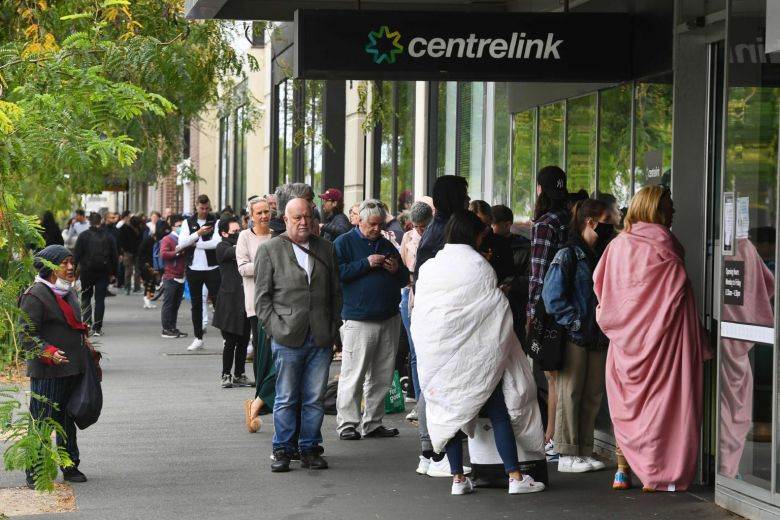To the followers of Per Capita and the readers of our work,
This letter is being written at my dining room table, as I and the rest of the Per Capita team are in our second week of working from home to avoid spreading the terrible virus that has upended our world. The devastation to lives and livelihoods has been swift and widespread, and our primary focus, like everyone’s, is getting our families and communities through the immediate crisis.
All we can be sure of right now is that our society, and our economy, will never be the same again – although that need not be a bad thing, in the long run.
Of course, in the immediate future, the outlook for many people is ruinous. The COVID-19 pandemic will result in a world-wide economic downturn unseen since the Great Depression almost a century ago. Global recession is inevitable; a depression (a recession lasting two or more years and/or a decline in GDP in developed nations of 10%) is almost certain.
Goldman Sachs has predicted that the Australian economy will shrink by 6% in 2020, and latest estimates are that unemployment will triple to more than 15%. These are levels unseen since 1932.
So what of the government’s response so far? The latest stimulus package announced by Prime Minister Scott Morrison on Sunday includes a welcome, if temporary, boost to unemployment benefits, but the result of years of running down public services was laid bare on Monday, as long queues of people thrown out of work waited hours to register for support with over-burdened Centrelink staff, and the online system crashed, unable to cope with even the first day of demand.

Other parts of the stimulus package are problematic. Allowing people to withdraw up to $20,000 from their superannuation is both ineffective and short-sighted: most low-income workers have negligible super balances on which to draw. Too many of those with small balances will be tempted to wipe out their savings altogether, and many more will do irreparable damage to their retirement nest eggs. With the market crashing, this imprudent policy simply kicks the can down the road, exacerbating inequality and making it harder for working people to recover in the long term.
The larger problem is that, in the face of a massive demand-side shock to our economy, the bulk of the government’s response is targeted to supply, and won’t support consumption. Business support is outsourced to the banking system through the provision of liquidity to provide loans. These will likely be skewed towards big corporations to which the banks can advance cash with lower risk than would be involved in lending to small businesses with no customers. Tax relief for small business doesn’t adequately ensure the continuation of employment for staff, and won’t be forthcoming for over a month. In all, it’s a poorly targeted solution that won’t work quickly enough to curtail mass unemployment and economic collapse.
Still, corporate Australia continues to push its discredited trickle-down agenda, with predictable calls from the business community to freeze the minimum wage, and from free-market think tanks to further deregulate our economy and subsidise capital, through “…a structural reform agenda to improve the investment climate and liberate risk taking”.
Yet it’s unregulated risk-taking in the pursuit of endless economic growth, and the capital hoarding of wealth, that has created a society ill-prepared to deal with a pandemic the likes of which we have not seen for a hundred years.
Just as individuals living with complex health conditions are at greater risk from COVID-19, our 21st century Western civilisation is beset by economic and social co-morbidities that leave us dangerously exposed to the impact of a crisis outside of our control.
The decades-long project to let free markets dictate our way of life has left societies riven with income and wealth inequality, insecure work, a deliberately degraded welfare state, and shrivelled pubic services. We are overly dependent for our wellbeing on powerful multinational corporations that routinely practice price gouging, wage theft and asset stripping, with no regard for the sustainability of the planet or the living standards of ordinary people.
More than a decade ago, the limits of the neoliberal economic project were laid bare, as unfettered financial speculation plunged the global economy into recession. Australia escaped the worst of it by dint of a swift, Keynesian stimulatory response, targeted directly at households, small business and public infrastructure.
Yet in the aftermath we, like the rest of the world, continued with business as usual. Banks were bailed out, the executives responsible for much of the collapse went unpunished, and we continued to build castles on sand, expanding GDP while pillaging the natural environment and increasing wealth and income inequality throughout the developed world.
So now, when a severe external crisis has hit, we find ourselves in a dystopian culture, in which panicked people come to blows over toilet paper, unable to trust that government has the institutional capability or will to see us through the truly frightening weeks and months ahead.

If we are, indeed, to not let this crisis go to waste, then business as usual is not an option. Throwing money at the market in the hope that, in the aftermath, it will retreat from wealth extraction and turn its focus to rebuilding society from the ground up is wilfully negligent.
Our capitalism is broken, and our response to this massive disruption may well be our last, best chance fix it: to reshape our economy to serve the wellbeing of people and the planet.
When we start to rebuild, it must be with the explicit purpose of reducing inequality and constructing an economically and ecologically sustainable world. Resolute government action is needed to create jobs in new industries, recover our manufacturing capability, lift wages and conditions for key workers in health, education, care and services, and revive the construction sector through a massive investment in new public housing. Income support for those unable to work for any reason must be permanently increased, and essential services returned to public provision where necessary, and strictly regulated where not.
After the Great Depression and the second world war, economic thinking was transformed across the Anglosphere. In America, this meant Roosevelt’s New Deal; in the UK, the creation of the National Health Service and the modern welfare state under the Attlee Labour Government.
In Australia, the Labor Governments of John Curtin and Ben Chifley rebuilt our economy through a determined and coordinated program of post-war reconstruction. Their reforms set us up for decades of prosperity and the creation of arguably the most prosperous and stable middle-class society on earth. Backed by the progressive economic thinking of HC (“Nugget”) Coombs, these renowned Labor leaders actively deployed the resources of government to pursue “…better standards of living [and] greater happiness to the mass of the people” – Chifley’s famous “light on the hill”.
75 years ago, the Curtin White Paper on Full Employment set the framework for a secure and prosperous society, with plentiful jobs, a strong social security system, investment in nation-building infrastructure, and the provision of secure and affordable housing. This underpinned three decades of sustainable and equitable growth, until global stagflation provided an excuse to revive a small-government, supply side economic system in the mid-1970s.

Over the last year, Per Capita has been working towards restoring this progressive, reforming agenda to tackle the twin crises of climate change and inequality. Our own White Paper on Full Employment for Australia’s Low Carbon Future will be released to coincide with the 75th anniversary of the tabling of the Curtin White Paper, on 30 May this year. The White Paper will be followed by a series of in-depth policy reports outlining the measures we need to take, collectively, to reclaim our society for the common good.
The Jobs for Australia summit we had planned for Old Parliament House on the 29th of May to celebrate the white paper anniversary will now almost certainly be postponed until later in the year, but we are working on bringing you a number of the presentations and panel discussions we have been planning through an online platform.
While this crisis may have disrupted our public events and activities, it only intensifies the need for us to work together to remake our society and our economy. The era of small government is over. Neoliberalism holds no answers to the challenges we will face in the months and years ahead.
We are all Keynesians now, and it cannot be a temporary shift. We must ensure that our collective effort is devoted to improving the lives of all Australians, and the sustainability of the world in which we live.
We have done this before, rebuilding and enriching society from the ashes of the Great Depression and the second world war. As we slowly emerge from this acute crisis, and grapple with the chronic challenge of climate change, surely we can, and must, do it again.
In the meantime, we will continue advocating for better policies and services to support Australians in these challenging times. We will call out bad ideas when we see them and push back against those who may seek to exploit fear and uncertainty to further entrench their own, unfair advantage.
We are looking forward – to a stronger, fairer and more sustainable Australia, and to the work we can do together to achieve it.
Take care, everyone – and remember to wash your hands!
In solidarity,
Emma.
To stay up to date with Per Capita’s work on Full Employment for Australia’s Low Carbon Future, and the upcoming online events and activities to mark the 75th anniversary of the Curtin White Paper on Full Employment, subscribe to our newsletter here and follow us on Facebook or Twitter.
If you are one of those fortunate enough to still be in secure work, and have the capacity to contribute to this important project, please consider making a tax deductible donation to Per Capita’s research fund here, or by contacting us as info@percapita.org.au
